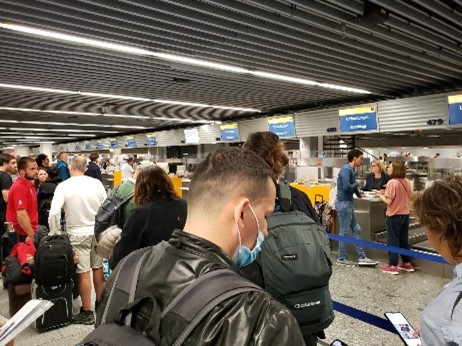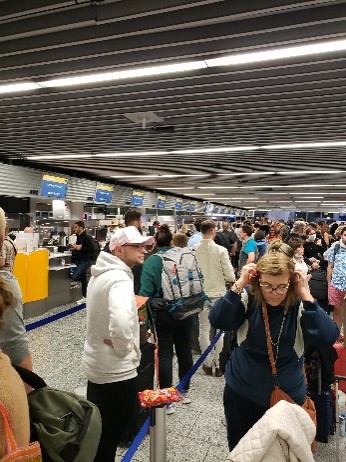A personal account of loss and unaccounted time value
We have a problem measuring exchanges of capital that plays out, unacknowledged, before our eyes every day. It’s the failure of our capitalist system – in which every transaction is measured in equal quantities of debit and credit – to account for the depletion of human time. Time is a limited resource for any human and ultimately the source of all capital, but there is no accounting for time in many economic exchanges.
The way we record these transactions makes it seem as if the account is complete, but that’s only because we apply no value to the most precious human resource: time. It’s a fact of life that each of us has a limited and unknowable amount of time in existence. We are born, we mature, we decline, and after so many days or months or years we die. There is great potential to the value that each of us will generate and consume between birth and death, but in our accounting it’s as if the value of a human being’s time is either infinite or zero and so we don’t bother to record it.
Before I relate my story of 24 hours lost in a missed flight connection, first a few quick but necessary words about debits and credits. Since there is no intrinsic value to money, its only value derives from the belief that we place in it as a neutral medium of exchange. Every transaction of money, anywhere on Earth, is measured in equal amounts of debit (the word means “belief owed”, being the use of capital) and credit (the word means “belief received”, which is the source of capital). In every transaction, source of capital must equal use of capital which means the total of debits must agree to the total of credits. Only when they are equal halves of a transaction will debit and credit together achieve, as we accountants say, “balance”. For example, if an airline sells me a round-trip ticket for $2,000, it records a $2,000 credit to income (capital source) and a $2,000 debit to cash (capital use). In my personal account, I record a $2,000 credit to cash and a $2,000 debit to expense. Here are three instances of balance: in the books of seller, the buyer, and the combination of both.
No accounting for a day lost
Although there is balance in this example, notice that it does not account for my time. What would the exchange look like if it did? Let me provide a personal example that involved 5 hours of distress and 24 hours lost from my life. The occasion was a missed flight connection in Frankfurt on September 16, during my return trip from Berlin to Toronto on an airline ticket that Lufthansa should not have sold to me in the first place. In my account, 24 hours’ worth of debit are missing and Lufthansa’s books fail to account for the credit the airline took for 24 hours of my life – which, like yours, is limited.
The source of distress was Lufthansa’s late departure from Berlin, a delay of over an hour. The ticket they sold me provided only a 70-minute window for transfer in Frankfurt to the Toronto flight. When I exited Lufthansa flight 187 around 5 p.m. I was left with about 5 minutes to cross the terminal and reach the connecting flight for its scheduled departure. Apologizing for the delay, Lufthansa encouraged us to make our way with all possible haste to connecting flights which may have also been delayed.
I followed their advice, barreling as fast as I could run while towing my carryon bag for what must have been 2 kilometres, from one section of the terminal to another, praying I would find the departing flight’s gate still open. Another passenger with the same connection was running even faster than I could.
I arrived at the gate a little more than 15 minutes late for the scheduled departure, but by then the plane was taxiing to the runway for takeoff. Seeing my red, sweat-covered face and look of despair, the gate agent did his best to calm me as he provided directions to Lufthansa’s service counter for rebooking.
Attempting a near-impossibility
Even in the best of conditions and an on-time arrival in Frankfurt, there would have been hardly any time to spare to get from one gate to the other. An able-bodied late-middle-aged person, such as I, would be hard pressed to make the long trek at a reasonable pace between gates and clear the passport control in anything under 40 minutes. That’s allowing only 15 minutes for a relatively short passport control line, which is a major variable. Gates typically close 15 minutes before departure, which means that to begin with my scheduled 70-minute layover was effectively only 55 minutes. Never having been in Frankfurt, I had no idea the distance between gates would be so vast. Fifty-five minutes less 40 in transit leaves a 15-minute window which, under ideal conditions, would be extremely tight and leave practically no time for a toilet break let alone any contingencies.
After watching the plane make its way to the runway, with my seat that I paid to select empty, it took me over 30 minutes to reach the Lufthansa service counter because the one I was directed to was closed. It turned out the airline’s rebooking agents were outside the departure terminal and so I had to exit through passport control again – this time with well over 100 people ahead of me in a very long line. When I reached the rebooking area, at about 6 p.m., my heart stopped when I saw hundreds with the same problem, already standing in a line that was moving painfully slowly.
Distress mounts
That pain of that line lasted for 4 hours until, finally, at around 10 p.m. a very kind rebooking agent secured for me the last available seat on an Icelandair flight to Toronto via Reykjavik the following day. For all of us in the line, it was a horrendous experience from the physical discomfort of standing that long with no information from the airline and nothing of substance to eat. All I received from Lufthansa was a bag of chips and box of juice. Here’s a photo of my dinner on September 16.

Dinner courtesy of Lufthansa
Tempers flared in the line. Here’s what the line looked like, from my vantage point, at 7 p.m. an hour after I arrived. It’s the first photo I took, after fear of a very long wait took hold. I was 4 rows deep at this time, having just advanced 1 row.

Lufthansa rebooking line. I am 4 rows deep
Here’s what the line looked like around 8 p.m. I was then 3 rows deep, and I didn’t know at the time it would be another 2 hours before I would be rebooked.

One hour later with two more to go, I have advanced one row
One man a half dozen spots ahead of me yelled frequently about the lack of management of the line as passengers tried to cut in front of him. The man in front of me slapped another passenger who tried to get ahead of him to join his travelling party. After over 3 hours the man behind me blew up and abandoned the line altogether; I suppose he then had to find and pay for his own way home. Around that time, I heard a man in the next row tell his neighbour, “I have been through every emotional stage and now I am calm.” I looked at him and nodded with a smile, indicating I too had abandoned all hope of a reasonable process and had reached the same stage of capitulation. One young man sat on the floor and began playing the guitar he was carrying, and his young travelling companions began to sing. I couldn’t understand the language of the songs but their music was the only happy part of the otherwise miserable experience. Here’s a photo of them entertaining the rest of us sharing the same plight.

A welcome touch of humanity: music and singing in the rebooking line
Fortunately the Icelandair connection that the agent obtained for me worked, but I arrived home almost exactly 24 hours later than scheduled on the ticket I bought and my luggage – for which Lufthansa charged me $75 – arrived nearly 3 days later than promised with one of its wheels missing. I will never get the lost time back. It’s not like I can add 24 hours to the end of my life, to recover that time and the potential that I could have applied on September 17. Who knows, I might die tomorrow, and then that lost time would be even more precious.
The unbalanced trades, and lost time, continue
It would be one thing if such an incident was isolated, a one-off in which I and the hundreds of others who lost hours and days of our lives happened to be among the unlucky few. But it wasn’t.
When I finally reached salvation at the rebooking window, the very kind Lufthansa agent (I think I heard a colleague call him Matthias) went out of his way to ensure my calm, addressing me with respect and a look that conveyed complete empathy. The human touch was of great value to me, by that point, and I am very grateful to him for it. Without my asking, Matthias said, “It is like this every day.”
So it was not an isolated incident and there was clearly an imbalance in my airplane ticket exchange from the outset.
This imbalance enabled Lufthansa to sell me a ticket with a 70-minute layover in Frankfurt with connection conditions so chaotic, as a calculated risk for the airline. In my case, the airline lost their gamble because they had to pay for my hotel, breakfast, and taxis from and to the airport.
But airlines will continue to sell such tickets when the debits and credits, at least the way we record them, produce an overall win for them. Human time and potential will continue to be lost, as long as the credits the seller receives exceed the debits they pay in losing gambles like the one they made on me. If such short-layover tickets begin to produce overall net losses for the airlines, of course they would stop selling them.
If Lufthansa were made to account for my lost 24 hours and the lost time of the hundreds of others stranded in that line, clearly the nature of the trade would change. Among other differences, airlines would no longer sell tickets with short layovers especially in airports with such long distances to navigate between gates.
If the debits truly equalled the credits, in a fully accounted value of our human limit in time, passengers would find themselves on a more even footing in exchanges like this. Our capitalist system shapes so much of the course of our time, in life events both bad and good, that it is time we ensure the debits and credits properly balance to zero between buyer and seller. Failure to correct the inequity and restore balance will continue to deplete the limited resource of human time and its potential and, in the end, become unsustainable. Until the system is fixed, trades like the one I made will remain out of balance.



